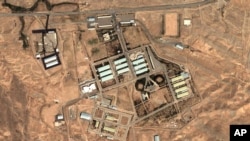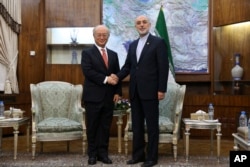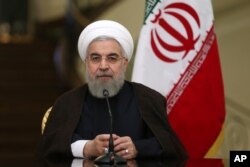The head of the International Atomic Energy Agency said Monday that "significant progress" has been made in the U.N.'s long-running probe into allegations Iran worked to develop nuclear weapons.
Yukiya Amano said he reported to the IAEA's board about his trip to Iran that included visiting the Parchin military site that has been a key focus of the investigation.
Amano said environmental samples were taken at Parchin before his visit in a process that included Iranian representatives "swiping samples." He specified that in some circumstances the IAEA permits countries to participate in verification activities in ways that do not compromise the agency's work.
"Authentication by the agency of the samples was achieved through use of an established verification process," Amano told reporters. "The process was carried out under our responsibility and monitoring. The samples have been brought to Vienna and will be analyzed by Agency experts."
Earlier Monday, Iran's state-run IRNA news agency quoted a spokesman for the country's nuclear agency saying samples were taken without IAEA inspectors present.
Parchin
For years, Iran denied access to IAEA personnel, insisting Parchin was strictly military in nature and would not be opened up to outsiders. Iranian officials have blamed the U.S. and Israel for the focus on Parchin, saying those countries provided faulty intelligence alleging research toward building nuclear weapons. Iran has long insisted its nuclear program is peaceful.
Iran and six world powers are heading toward implementation of the accord to keep Tehran from developing a nuclear weapon in exchange for lifting sanctions that have hobbled the Iranian economy. The United States, Britain, France, Germany, Russia and China reached the deal with Iran in July.
Tehran is already renewing trade relations with other countries. France opened a business office in Tehran Monday, while Iranian Transport Minister Abbas Akhoundi said Iran plans to buy American-made Boeing jets and Airbus planes made in Europe to replace its aging commercial fleet.
Amano's visit to Iran also included meetings with President Hassan Rouhani, nuclear chief Ali Akbar Salehi and Foreign Minister Mohammad Javad Zarif.
In those meetings, and with Iranian lawmakers, the IAEA said Amano discussed the U.N.'s investigation as well as the verification and implementation of the wider agreement Iran reached in July with a group of six world powers.
Amano is due to deliver a final report on the IAEA investigation by December 15. Sanctions relief from the agreement with the U.S., Britain, China, France, Russia and Germany is contingent on Iran satisfying the U.N.'s questions about the allegations it worked to develop nuclear weapons.
Iran will comply
Meanwhile, Rouhani says a majority of people in Iran support the international agreement, even if some hardliners denounce the deal.
Rouhani told CBS' 60 Minutes in an interview broadcast in the U.S. Sunday that once approved by relevant institutions within Iran "everyone will comply."
"The majority of our people, in opinion polls, have a positive view of the agreement," he said. "And usually institutions like the parliament and the Supreme National Security Council, are usually not far removed from public opinion and move in that direction."
Rouhani also talked about the potential for wider ramifications of the deal when it comes to Iran's relationship with the United States, saying a lack of trust between the two countries will not soon disappear, but that he believes the negotiations mark a first step toward decreasing the enmity between them.
"Many areas exist where in those areas it's possible that common goals, or common interests, may exist," he said. "But what is important is that in the nuclear agreement, we see how the two sides behave in action. Enacting this deal in a good way will create a new environment."
Criticism
Israel and other opponents of the nuclear agreement say the agreement that limits Iran's nuclear activity in exchange for sanctions relief will leave Iran with too much of a nuclear program in tact and the possibility of building a weapons program in the future.
Last week, Democrats in the U.S. Senate defeated Republican efforts to lodge a vote against the terms of the agreement during the 60-day review period lawmakers had from the day they got the official text of the deal.













